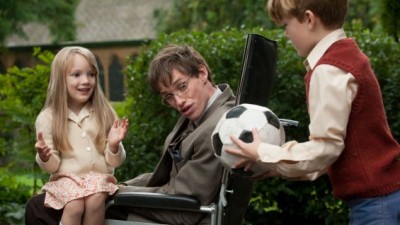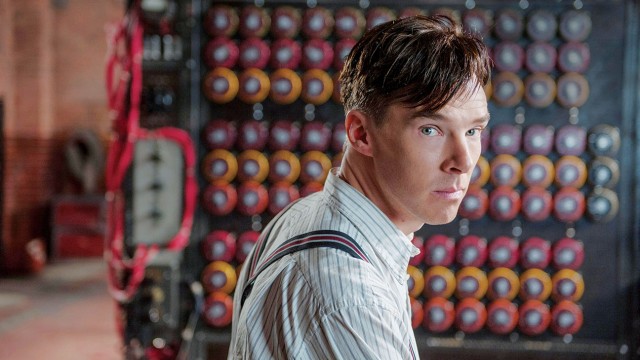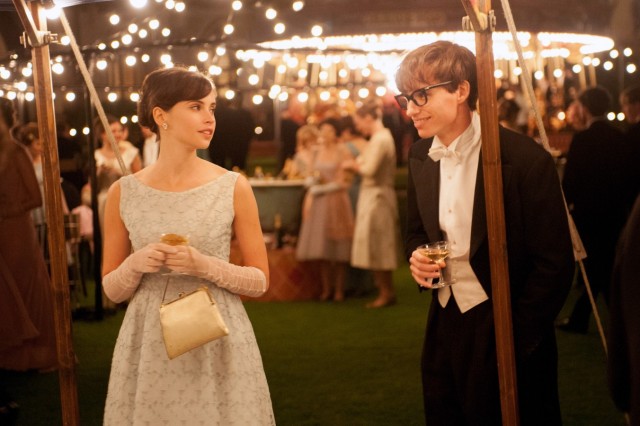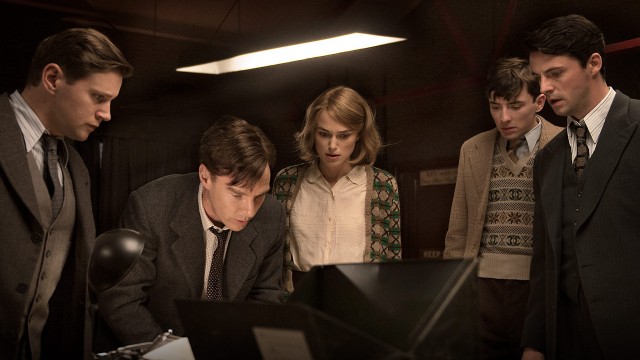THE IMITATION GAME (Morten Tyldum, 2014)
In theaters now
www.theimitationgamemovie.com

THE THEORY OF EVERYTHING (James Marsh, 2014)
In theaters now
www.focusfeatures.com
 This year’s heated Oscar race features a pair of fact-based British films about two of the most intelligent and important men of the last hundred years, but their life stories couldn’t be more different. The Theory of Everything follows Oxford-born theoretical physicist and cosmologist Stephen Hawking (Eddie Redmayne) as he falls in love with linguist Jane Wilde (Felicity Jones) and is stricken with motor neuron disease while at Cambridge; at the age of twenty-one he is given two years to live, but more than fifty years later he is still alive and vibrant at seventy-three, celebrated far and wide as the smartest human being on the planet. On the other hand, The Imitation Game is about London-born mathematician Alan Turing (Benedict Cumberbatch), who died in shame and obscurity in 1954 at the age of forty-one; it would be more than fifty years before his remarkable work for the British government during WWII would be revealed to the public. In both films, the protagonist is on a scientific quest; in The Imitation Game, Turing is trying to break the seemingly unbreakable code of the Nazis’ Enigma machine, while Hawking is after nothing less than a single mathematical equation that can explain the vast universe. Both films were based on recent books, The Imitation Game on Andrew Hodges’s Alan Turing: The Enigma, and The Theory of Everything on Travelling to Infinity: My Life with Stephen by Jane Hawking. Both films feature extensive scenes filmed on location where some of the action originally took place, The Imitation Game in Bletchley Park and The Theory of Everything at Cambridge.
This year’s heated Oscar race features a pair of fact-based British films about two of the most intelligent and important men of the last hundred years, but their life stories couldn’t be more different. The Theory of Everything follows Oxford-born theoretical physicist and cosmologist Stephen Hawking (Eddie Redmayne) as he falls in love with linguist Jane Wilde (Felicity Jones) and is stricken with motor neuron disease while at Cambridge; at the age of twenty-one he is given two years to live, but more than fifty years later he is still alive and vibrant at seventy-three, celebrated far and wide as the smartest human being on the planet. On the other hand, The Imitation Game is about London-born mathematician Alan Turing (Benedict Cumberbatch), who died in shame and obscurity in 1954 at the age of forty-one; it would be more than fifty years before his remarkable work for the British government during WWII would be revealed to the public. In both films, the protagonist is on a scientific quest; in The Imitation Game, Turing is trying to break the seemingly unbreakable code of the Nazis’ Enigma machine, while Hawking is after nothing less than a single mathematical equation that can explain the vast universe. Both films were based on recent books, The Imitation Game on Andrew Hodges’s Alan Turing: The Enigma, and The Theory of Everything on Travelling to Infinity: My Life with Stephen by Jane Hawking. Both films feature extensive scenes filmed on location where some of the action originally took place, The Imitation Game in Bletchley Park and The Theory of Everything at Cambridge.
In each film, the genius is supported by the love and friendship of a smart, beautiful woman (Jones as Wilde in Theory, Keira Knightley as Joan Clarke in Imitation), without whom he would probably have never achieved what he did. The Imitation Game plays with the truth more than The Theory of Everything, at least in part because there is much more information available about Stephen and Jane, through books, interviews, public appearances, etc., and not just because the two of them participated in the making of the film (screenwriter Graham Moore spoke extensively with Ms. Hawking, but living and dead subjects have been known to tell a fib or two about themselves). In comparison, Turing’s work was kept secret for half a century, and there is not a cadre of people still around who knew him well. At the Oscars, the films will compete for Best Actor (Cumberbatch, Redmayne), Best Original Score (Alexandre Desplat, Jóhann Jóhannsson), Best Adapted Screenplay (Moore, Anthony McCarten), and Best Picture. In addition, Jones is nominated for Best Actress, Knightley for Best Supporting Actress, and The Imitation Game is also up for Best Director (Morten Tyldum), Best Production Design (Maria Djurkovic and Tatiana Macdonald), and Best Film Editing (William Goldenberg). At the BAFTAs, The Theory of Everything and Redmayne beat out The Imitation Game and Cumberbatch for Outstanding British Film, Adapted Screenplay, and Leading Actor.

Stephen Hawking (Eddie Redmayne) makes sure to spend time with his family in THE THEORY OF EVERYTHING
Both films were made by directors who are not quite household names, and neither of whom is up for an Academy Award: James Marsh (The Theory of Everything) is an accomplished British documentarian who won an Oscar for Man on Wire and also made the little-seen thriller Shadow Dancer and the popular doc Project Nim, while Tyldum (The Imitation Game) is a Norwegian director whose previous films include the action thriller Headhunters and Buddy, about a danger-loving Oslo twentysomething. While The Theory of Everything plays out chronologically, following Stephen Hawking from his Cambridge days to the publication of his seminal 1988 book, A Brief History of Time: From the Big Bang to Black Holes and beyond, The Imitation Game is structured around the arrest of Turing for being a homosexual, telling his story to a detective (Rory Kinnear) who thinks Turing is hiding something. They’re both extremely well made, entertaining films with extraordinary lead performances and superb supporting casts, but the edge goes to The Imitation Game, which holds more surprises and mystery than the melodramatic Theory, which pulls harder at the heartstrings, though without overdoing it. Imitation is a multifaceted examination of class, society, science, gender, sexuality, and war, while Theory is a fairly straightforward romance, with science as the backdrop. Each film depicts its main character as a kind of superhero, at intellectual levels far surpassing that of ordinary men, but it’s perhaps most fascinating watching how they interact with others; Turing is deadly serious, often cold and callous, so driven that he has no time to consider others’ feelings, preferring to work alone in his designated group, while Hawking revels in the love of his wife and children and is kind and thoughtful of everyone he meets, understanding that he is just one part of an enormous universe. Regardless of which film wins more awards, it’s been both awe-inspiring and heartbreaking getting to know each man onscreen, two geniuses who changed the world but in many ways are polar opposites. But for those keeping score at home, Boyhood beat them both for Best Film at the BAFTAs.


